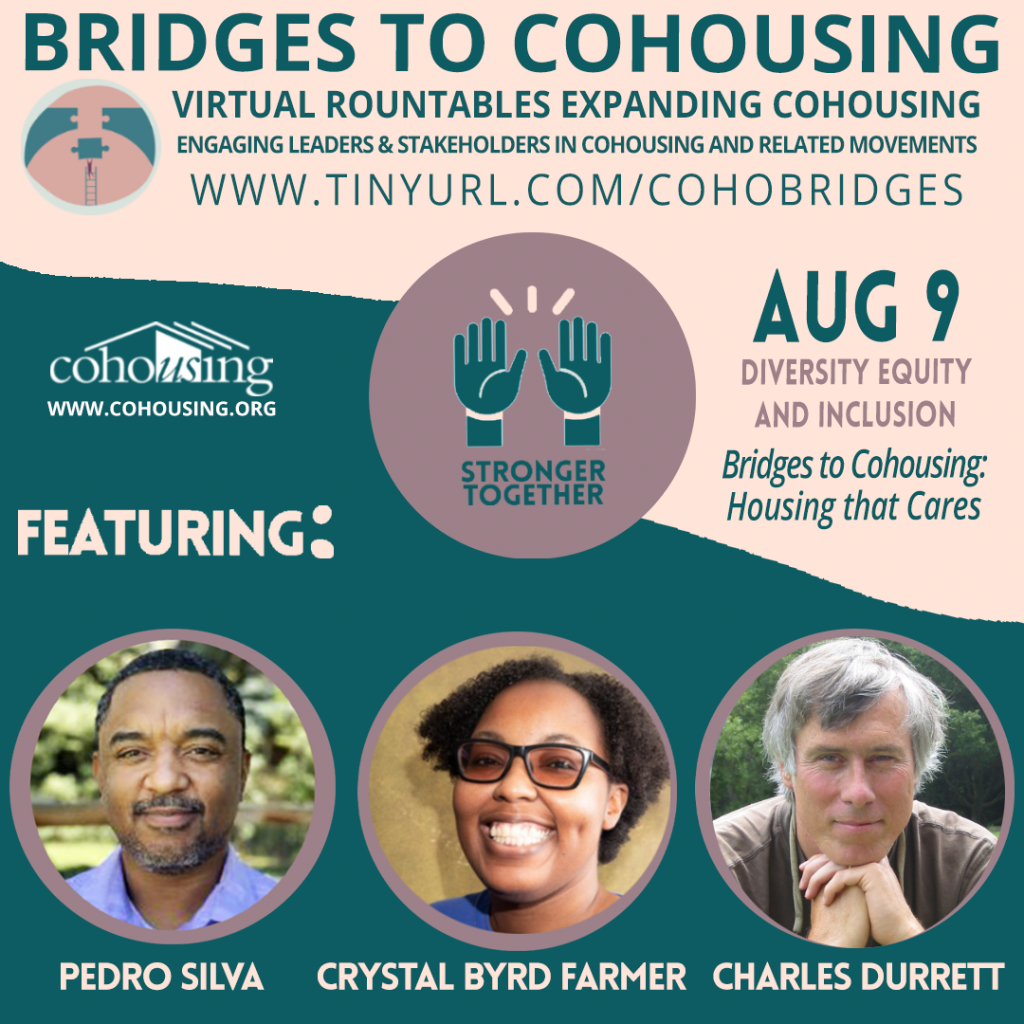Opportunities for Cohousing Communities to Become More Socially Inclusive
A summary of the 8/9 Bridges to Cohousing Virtual Roundtable: Housing That Cares focused on DEI

The third and final virtual roundtable in the Bridges to Cohousing series was focused on Diversity, Equity and Inclusion—or what Pedro Silva (one of the presenters) refers to as “JODIE” an acronym for Justice, Opportunity, Diversity, Inclusion and Equity. Pedro spoke a lot about how communities can take action to be invitational as well as the importance of examining our language and narratives. We also heard from Crystal Byrd Farmer about how marginalized people can experience microaggressions and the important ways those with privilege can support reparations. Chuck Durrett shared about a systemic approach to building inclusive communities based on his proven success developing cohousing-inspired housing for homeless residents. Throughout the dialogue we emphasized the importance of being sensitive to not cause unintended harm, and the importance of those with privilege cultivating skills and structures to create space for the learning and vulnerable communication this requires.
Pedro emphasized how developing opportunities is the primary way people take action in support of JODIE. He acknowledged that one of the easiest ways for cohousing communities to be more diverse is to be invitational in the early forming stages—to reach out to recruit residents representing diverse backgrounds from the beginning. Chuck Durrett used the example of Silver Sage Cohousing in Boulder as an example of a community that was economically diverse where a portion of the units were $1M while others were priced at 10% the market value (covered in more detail in the Affordability roundtable). Chuck also mentioned a cohousing community in Berkeley started by single moms that reflects the potential for marginalized people to drive cohousing development. Crystal reinforced this strategy speaking about the BIPOC Intentional Community Council she is part of where folks from marginalized ethnic groups are intentionally spearheading communities that support a greater sense of belonging for minority people. If a forming cohousing community wants to be more diverse, they can do research and outreach to people from diverse demographic groups to invite them into the development process.
Of course, being invitational from the start doesn’t work for existing cohousing communities which many people agree tend to be mostly homogenous despite residents valuing diversity. This lack of diversity can relate to many factors such as the historic tendency for homeownership to be concentrated for people with privilege who tend to be white and middle class. We heard about two overarching approaches to developing more opportunities for JODIE in existing communities. One is internal solutions where there is an explicit effort on the part of residents to overcome unconscious bias and dynamics that get in the way of inclusion. The other approach is to see cohousing communities as a hub for social justice work in the greater community.
Internal solutions for communities require skillfulness such as using conflict resolution methods like non-violent communication or restorative justice. Pedro and Crystal emphasized how important it is for people with privilege to do the work to research and have uncomfortable conversations to gain more awareness about their unconscious bias and narratives. In the roundtable, we heard about one person wanting to spearhead an anti-racism group in their cohousing community as a way to implement this solution in their group. Pedro also mentioned an approach called “Living Room Conversations” that includes over 150 templates for having difficult conversations with people with different viewpoints. Chuck mentioned how the communities he’s studied that are housing formerly homeless people have social services built-in such as counselors on-site to support the inevitable challenges that arise for folks who have PTSD and other kinds of trauma from years of hardship and stress. Being sensitive to the pain and trauma that comes up in exploring JODIE-related issues is important, and its recommended that people seek support such as training and mediation to minimize harm in this process.
Beyond these internal solutions supporting residents of cohousing communities, we also heard about existing and potential ways that people in the cohousing movement can get involved with supporting greater social justice in their larger communities. Chuck Durrett’s work with promoting cohousing-inspired housing for homeless people is one such example. He talked about his advocacy mobilizing people with privilege to take initiative in implementing local solutions. Crystal talked about the importance of reparations being made, and one example Pedro offered was researching the original native peoples where your community is based and inviting them to use your common house for free. Some participants in the roundtable had an idea about hosting an anti-racism book club for their larger community.
More details about each of these solutions are available in the recording of the virtual roundtable. One overarching theme throughout this exploration was that while JODIE work is very important, and a high value for many in the cohousing movement, it is the most complex in that it requires people going out of their comfort zone and changing habituated patterns often related to highly sensitive and emotionally charged experiences. We see this event/recording as a small step in our exploration of how cohousing can support greater JODIE in our world. We will be gathering feedback from this initial Bridges series to help inform future programming.
Category: Uncategorized
Tags:
Views: 51232

